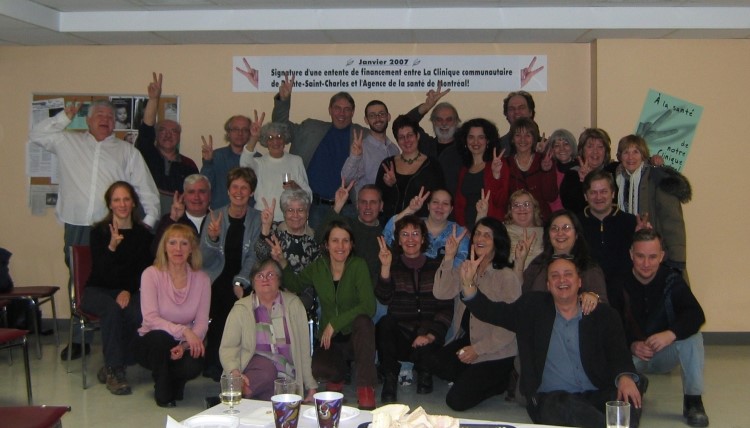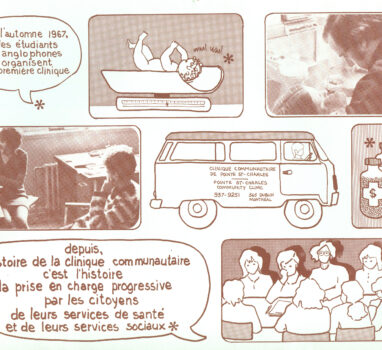1968-1970
In 1968, students in medicine, nursing and sociology at McGill University, concerned with lack of adequate medical services in the neighbourhood, set up the Community Clinic. They quickly got local residents involved in the project.
At that time, in addition to the medical students, the staff consisted of a nurse, a parttime doctor and a psychologist. The kind of medicine they practised tied together health problems and social problems, and focused on their root causes.
In 1970, the Clinic obtained its charter as a community organization. The objectives of the corporation are then formulated in the English language as follows:
The corporation is incorporated for the following purposes:
- To promote, obtain and provide community health services
- To establish, encourage and maintain community health clinics
- To encourage and promote all legislation and other measures which would have the effect of helping members of the community attain a higher standard of health
The first citizens’ board of directors was established and the work team had 17 members. The community-based health and social services of the Clinic became the model for the local community service centres (CLSC) network.
1971-1973
Inspired by the popular clinics of the time (Clinique St-Jacques, Clinique du Peuple de St-Henri and Clinique communautaire de Pointe-Saint-Charles), the Quebec government plans to create Local Community Service Centers (CLSCs) throughout the province (Bill 65). The Clinic supports this idea, but requests that the CLSCs be controlled by citizens. This is the first great struggle for the survival of the Clinic, which requires not to be transformed into a CLSC.
1974
The Government of Québec set up the CLSC in 1974. The Clinic asked that the legislation be broadened to include recognition of popular clinics. From that time on, the Clinic was recognized as an independent community organization with the mandate of a CLSC. The Clinic is subsidized like a CLSC, but can retain its citizen decision-making structure.
1977-1979
The story repeats itself. The Quebec government wants to force the Clinic to become a CLSC. Following a great mobilization, the Minister of Health at the time, Mr. Lazure, finally confirmed the special status of the Clinic in 1979: “Given your existence prior to the establishment of the CLSCs, the Ministry of Social Affairs has confirmed its intention not to assimilate you to this type of establishment but to respect the specific nature of your organization. “
As the years passed, the Clinic expanded its services and its staff grew from 30 in 1974 to 90 in 1986.
1990-1993
In 1992, the adoption of theAct respecting health services and social services was a crowning point in the Clinic’s struggle for independence. The Ministry gave the Clinic a choice, which was not a choice at all: continue as a community organization or become a CLSC. This attempt at assimilation failed due to large-scale mobilization by the neighbourhood’s population and community groups.
Minister Marc-Yvan Côté finally gave in to this pressure and Bill C-120 was amended to protect the special status of the Clinic. We owe the failure of this attempt at assimilation to a great mobilization of the population and community groups in the neighborhood.
The flip side of this great victory is the fact that budget allocation is increasingly done through programs determined by the government – it is the Régie Régionale, created in 1993, which becomes the Clinic’s new financial partner. Therefore it becomes increasingly difficult for the Clinic to distribute the amounts received according to the priorities decided by the neighborhood. Although this situation is worrisome, it may be the compromise necessary for the survival of the only community clinic still managed by a 100% citizen board of directors.
2004-2007

In 2004, the Charest government adopted a series of binding laws under the gag order: it is laws 7 and 8, which “de-unionized” certain categories of workers: laws 25 and 30, which imposed mergers of establishments and union accreditation in the health and social services sector; Law 31, which promotes subcontracting.
It was at this time, under Law 25, that the Health and Social Services Centers (CSSS) were born from the merger of CLSCs, residential and long-term care centers (CHSLDs) and, in the majority cases, from a hospital center.
The Clinic once again fights for its survival! The workers and the population of the neighborhood are waging a great fight to try to prevent the annexation of the Clinic to the CSSS Sud-Ouest-Verdun.
In 2005, following the adoption of these laws, the Montreal Health Agency reopened the Clinic’s funding agreement. At that time, the government wanted the Clinic to be funded by the CSSS according to the priorities of the CSSS. Following two years of close negotiations between the Montreal Health Agency, the Clinic and the CSSS Sud-Ouest/Verdun, it’s finally victory! A funding agreement has been signed between the Pointe-Saint-Charles Community Clinic and the Montreal Health and Social Services Agency.
This agreement allows the Clinic to:
- keep its alternative status as an autonomous community organization with a CLSC mandate within the Quebec health system,
- continue to receive the budgets granted to the CSSS for the CLSC mission and to develop service agreements with community groups in the neighborhood,
- receive all the necessary information and participate in the working committees of the Health Agency or the CSSS which are relevant to our CLSC mission,
- develop a partnership agreement with the CSSS to ensure that our population has access to services not offered by the Clinic (for example: 2nd line services).
The Clinic is therefore not subjected to the CSSS like the other CLSCs and continues to receive its funding directly from the Montreal Health and Social Services Agency.
2014
Law 10 of the Minister of Health and Social Services, Gaétan Barrette, reorganizes the entire health network in 18 super establishments: the Integrated Health and Social Services Centers (CISSS) and the Integrated University Health and Social Services Centers (CIUSSS). However, the Pointe-Saint-Charles Community Clinic is not merged with one of the newly created super structures. On the other hand, Law 10 has the effect of eliminating the Montreal Health and Social Services Agency and the CSSS Sud-Ouest-Verdun, that is, the clinic’s two contacts in regards to its funding, accountability and collaborations with the health network. For the moment, nothing indicates that our annual management agreement and the funding of our services will not be renewed.
2018
The Clinic celebrates its 50th anniversary!!
Today
Today the Clinic has 130 employees covering the range of employment status. It is still independent and continues to fulfill its CLSC mandate.
Today more than ever, this original community project, so closely linked to our public health system, is something to keep watching and a great, continuing story of a neighbourhood.
They talk about us!


